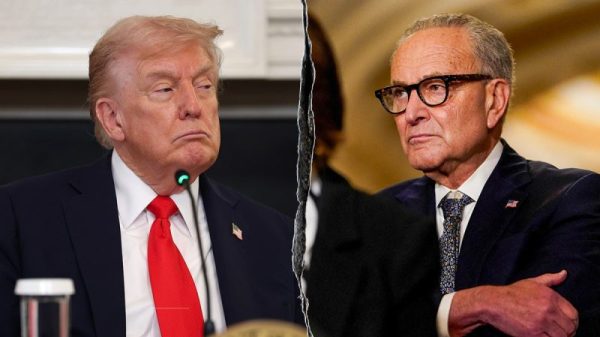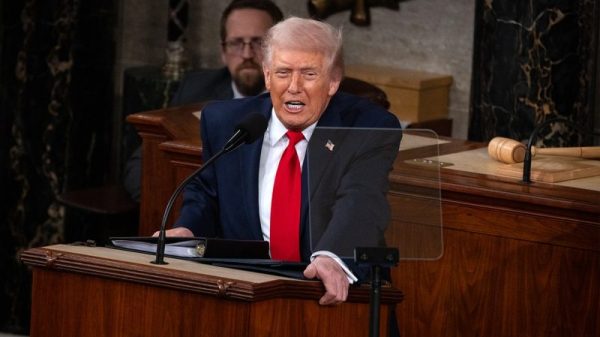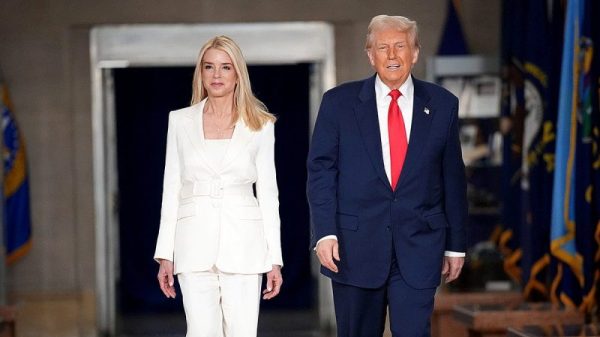President Biden and Mexican President Andrés Manuel López Obrador on Friday reaffirmed their commitment to working together to address migration and combat fentanyl trafficking to the U.S., tackling two issues that have been the main lines of attack against the administration by 2024 Republican presidential candidates.
The two leaders have at times found themselves publicly at odds. And López Obrador, who skipped a Los Angeles summit last year on migration because the U.S. declined to invite three authoritarian countries in the Western Hemisphere, nearly decided not to attend this week’s Asia-Pacific Economic Cooperation conference before changing his mind.
During Friday’s meeting in San Francisco, where they were in town for APEC, they were largely complimentary to each other. Biden and López Obrador pledged to work together on two key issues that have long been the source of conflict between their two nations, though the two didn’t announce major new initiatives.
“We are sincerely committed to continu(ing) to assist at the fullest capacity to prevent drug trafficking, namely the entrance of fentanyl and other chemical precursors,” López Obrador said through an interpreter, adding that Mexico is “fully aware of the damage that it poses to the United States’ youth.”
“I want to tell you about my great conversation with (Chinese President) Xi Jinping on that issue,” Biden told López Obrador, an apparent reference to the agreement that he reached with China’s leader this week to reduce the flow of fentanyl into the U.S.
The Mexican leader also thanked Biden for his administration’s work on migration, emphasizing that “Further progress needs to be made to address the migratory phenomenon. We’re working on that jointly, in coordination.”
Biden told López Obrador he “couldn’t have a better partner.” The Mexican leader called his counterpart a “good man” and an “extraordinary president.”
Republicans have sought to tie Biden and his policies to the surge in migrants along the southern border and the proliferation of illicit and deadly drugs, such as fentanyl, coming into the U.S.
In 2022, fatal drug overdoses plateaued but remained near a record high. And in August, the number of migrants crossing the U.S.-Mexico border reached an all-time high, before declining this fall after the resumption of deportation flights to Venezuela. Crossings still remain unusually high and cities are struggling to accommodate growing migrant populations.
Biden’s handling of the migration issue appears to be one that he is expected to continue to confront in 2024.
In a September Washington Post-ABC News poll, 23 percent of respondents said they approved of Biden’s handling of the immigration situation at the U.S.-Mexico border while 62 percent said they disapproved. That compares with 28 percent approval and 59 percent disapproval in February.
This weekend, former president Donald Trump is expected to head to the U.S.-Mexico border in South Texas as he seeks to exploit those weak numbers. There, he and Gov. Greg Abbott (R) will serve meals to members of Operation Lone Star, the governor’s state-led border crackdown, which has been the subject of several legal battles.
The Rio Grande Valley along the U.S.-Mexico border, where Trump will visit, has been seen as an opportunity for Republicans to make strides with Latino voters.
The state’s GOP presidential primary is not until March, but if Trump wins the race, it could help give him a significant amount of delegates. In 2020, Biden lost Texas by six points, coming closer than any Democratic presidential candidate in years, as the state’s demographics shifted.
President Biden and Mexican President Andrés Manuel López Obrador on Friday reaffirmed their commitment to working together to address migration and combat fentanyl trafficking to the U.S., tackling two issues that have been the main lines of attack against the administration by 2024 Republican presidential candidates.
The two leaders have at times found themselves publicly at odds. And López Obrador, who skipped a Los Angeles summit last year on migration because the U.S. declined to invite three authoritarian countries in the Western Hemisphere, nearly decided not to attend this week’s Asia-Pacific Economic Cooperation conference before changing his mind.
During Friday’s meeting in San Francisco, where they were in town for APEC, they were largely complimentary to each other. Biden and López Obrador pledged to work together on two key issues that have long been the source of conflict between their two nations, though the two didn’t announce major new initiatives.
“We are sincerely committed to continu(ing) to assist at the fullest capacity to prevent drug trafficking, namely the entrance of fentanyl and other chemical precursors,” López Obrador said through an interpreter, adding that Mexico is “fully aware of the damage that it poses to the United States’ youth.”
“I want to tell you about my great conversation with (Chinese President) Xi Jinping on that issue,” Biden told López Obrador, an apparent reference to the agreement that he reached with China’s leader this week to reduce the flow of fentanyl into the U.S.
The Mexican leader also thanked Biden for his administration’s work on migration, emphasizing that “Further progress needs to be made to address the migratory phenomenon. We’re working on that jointly, in coordination.”
Biden told López Obrador he “couldn’t have a better partner.” The Mexican leader called his counterpart a “good man” and an “extraordinary president.”
Republicans have sought to tie Biden and his policies to the surge in migrants along the southern border and the proliferation of illicit and deadly drugs, such as fentanyl, coming into the U.S.
In 2022, fatal drug overdoses plateaued but remained near a record high. And in August, the number of migrants crossing the U.S.-Mexico border reached an all-time high, before declining this fall after the resumption of deportation flights to Venezuela. Crossings still remain unusually high and cities are struggling to accommodate growing migrant populations.
Biden’s handling of the migration issue appears to be one that he is expected to continue to confront in 2024.
In a September Washington Post-ABC News poll, 23 percent of respondents said they approved of Biden’s handling of the immigration situation at the U.S.-Mexico border while 62 percent said they disapproved. That compares with 28 percent approval and 59 percent disapproval in February.
This weekend, former president Donald Trump is expected to head to the U.S.-Mexico border in South Texas as he seeks to exploit those weak numbers. There, he and Gov. Greg Abbott (R) will serve meals to members of Operation Lone Star, the governor’s state-led border crackdown, which has been the subject of several legal battles.
The Rio Grande Valley along the U.S.-Mexico border, where Trump will visit, has been seen as an opportunity for Republicans to make strides with Latino voters.
The state’s GOP presidential primary is not until March, but if Trump wins the race, it could help give him a significant amount of delegates. In 2020, Biden lost Texas by six points, coming closer than any Democratic presidential candidate in years, as the state’s demographics shifted.





















